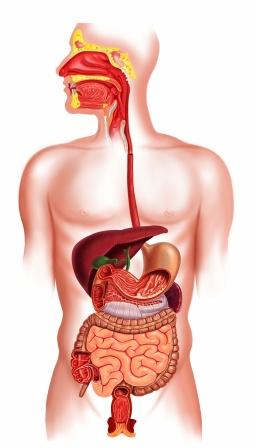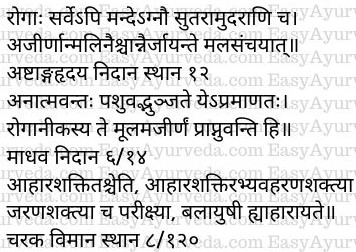Ahara Shakti Pariksha Examination Of Digestion Power
By Dr Raghuram Y.S. MD (Ay) & Dr Manasa, B.A.M.S
Food is the basic need and one of the supporting pillars of our life, the other two being sleep and celibacy. Food provides energy and all life activities depend on food choices and the capacity of the body to digest and convert into energy.
Read – How Much Food To Eat Per Day As Per Ayurveda?

Table of Contents
Introduction
Digestion power is different for different individuals. It is also different for different kinds of foods in the same given individual.
The food should be digested properly not just for obtaining energy but also because improperly digested foods cause formation and accumulation of unwanted things like ama and excreta in the body. They cause damage to tissues in the long term. This forms the foundation for many disorders to manifest in future days. The intermediate products of digestion like ama in due course of time become body toxins and disturb smooth functioning of all organs and systems.
Read – What Is The Right Time For Food? How Many Meals A Day?
Therefore while examining the disease or diseased the physician should duly consider the examination of digestion power of the patient.
Master Vagbhata says that all diseases have their origin from a weak digestion power, mainly the abdominal disorders. Indigestion of food, consumption of contaminated foods and accumulation of wastes in the body are the other causes.
In Madhava Nidana we can find a reference
‘People who do not have self control over their food habits eat with animal instinct. This becomes responsible for manifestation of indigestion which is the root of many diseases’.
Read – Understanding Agni: Concept, Definition, Functions, Types
Another reference about ama tells – ‘Wherever there is ama, pain (disease) is manifested in the same place’.
This ama is a byproduct of improper digestion. Ama is the root source of many disorders.
Sama Agni or balanced digestive capacity is one of the signs of comprehensive health. Therefore a balanced state of digestive fire and signs of proper digestion of food indicates good health of the digestive system and overall health. On the other hand, imbalanced digestive power and signs and symptoms of indigestion of food suggest bad health of the digestive system and overall bad health.
Read – Importance Of Diet (Pathya) For Specific Diseases
Sanskrit Verses

Agni Imbalances, Kinds of Indigestion
There are mainly 3 kinds of imbalanced digestive fire. They are –
| Sl No | Kind of imbalance of digestive fire | Dosha influence on digestive fire | Kind of indigestion caused | Consequences |
| 1 | Mandagni – weak fire and decreased digestive capacity | Kapha | Amajirna – food is improperly and incompletely digested | Kapha disorders |
| 2 | Tikshnagni – intense fire and increased digestive capacity | Pitta | Vidagdhajirna – food is burnt and also digested in quick time | Pitta disorders |
| 3 | Vishamagni – fluctuating and weird fire and erratic / fluctuating / unpredictable digestive capacity | Vata | Vishtabdajirna – food is sometimes digested properly and sometimes poorly | Vata disorders |
The entire branch of Kayachikitsa deals with curing the diseases by means of balancing the digestive fire. Therefore analyzing the digestive power of the patient is a key component of examination of the patient.
Read – Understanding Digestion Process From An Ayurveda View
Examination of Ahara Shakti
Master Charaka tells –The patient should be examined from the viewpoint of his digestive capacity.
Ahara Shakti means the measure of what quantity of food one would comfortably consume and what and how much is his capacity to digest the consumed food. The examination of the capacity of digestion of food is very essential while examining the patient because the food is the chief source for one’s strength and sustenance of life.
Click to Consult Dr Raghuram Y.S. MD (Ayu)
Questions to patient
Do you take non vegetarian food? Generally good Ahara Shakti
Approximately how much oil or ghee or fat you use in your diet? What is the nature of fat that you use? Which oil do you use to cook?
Questions related to bowel movements, digestive health








